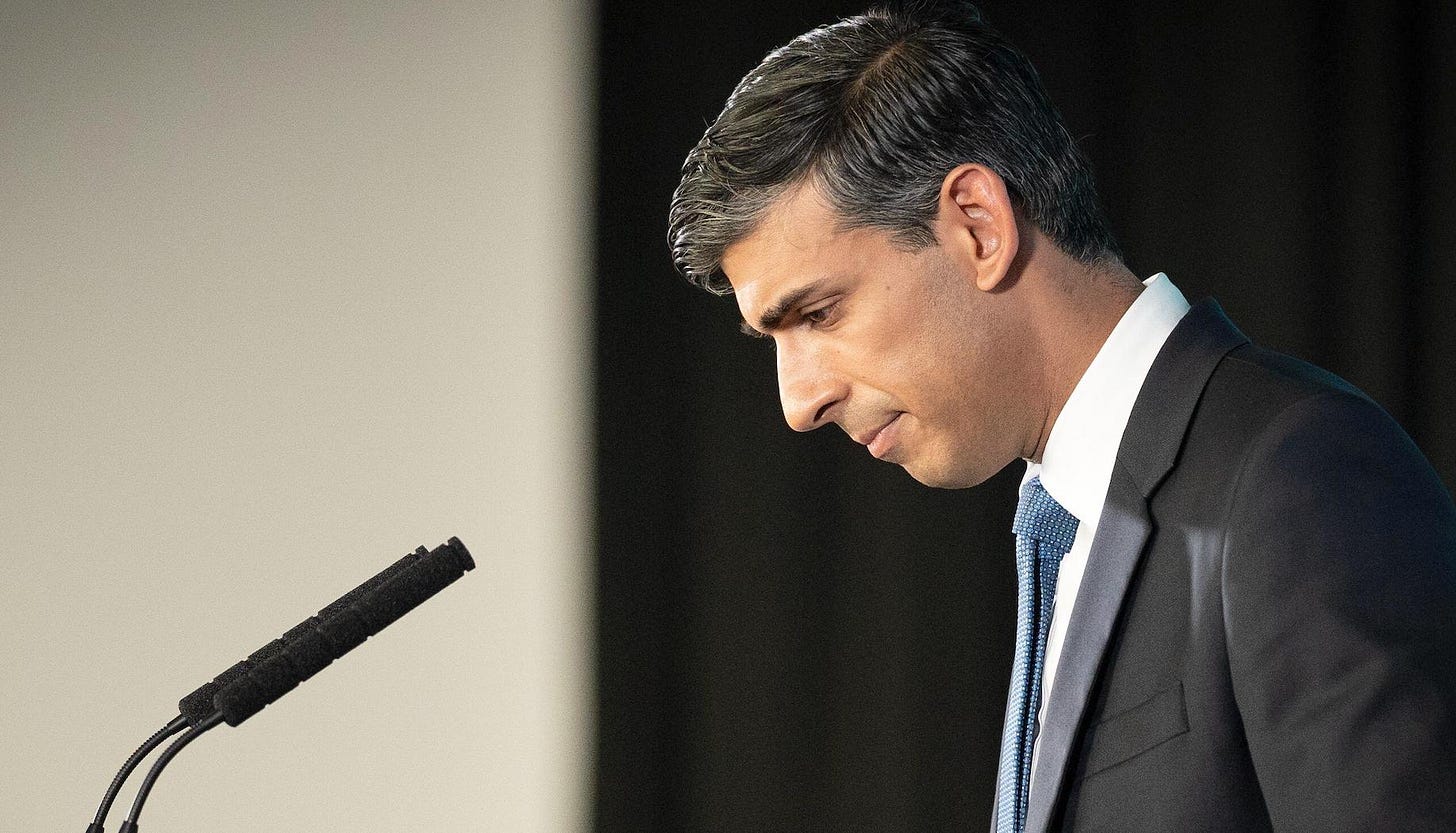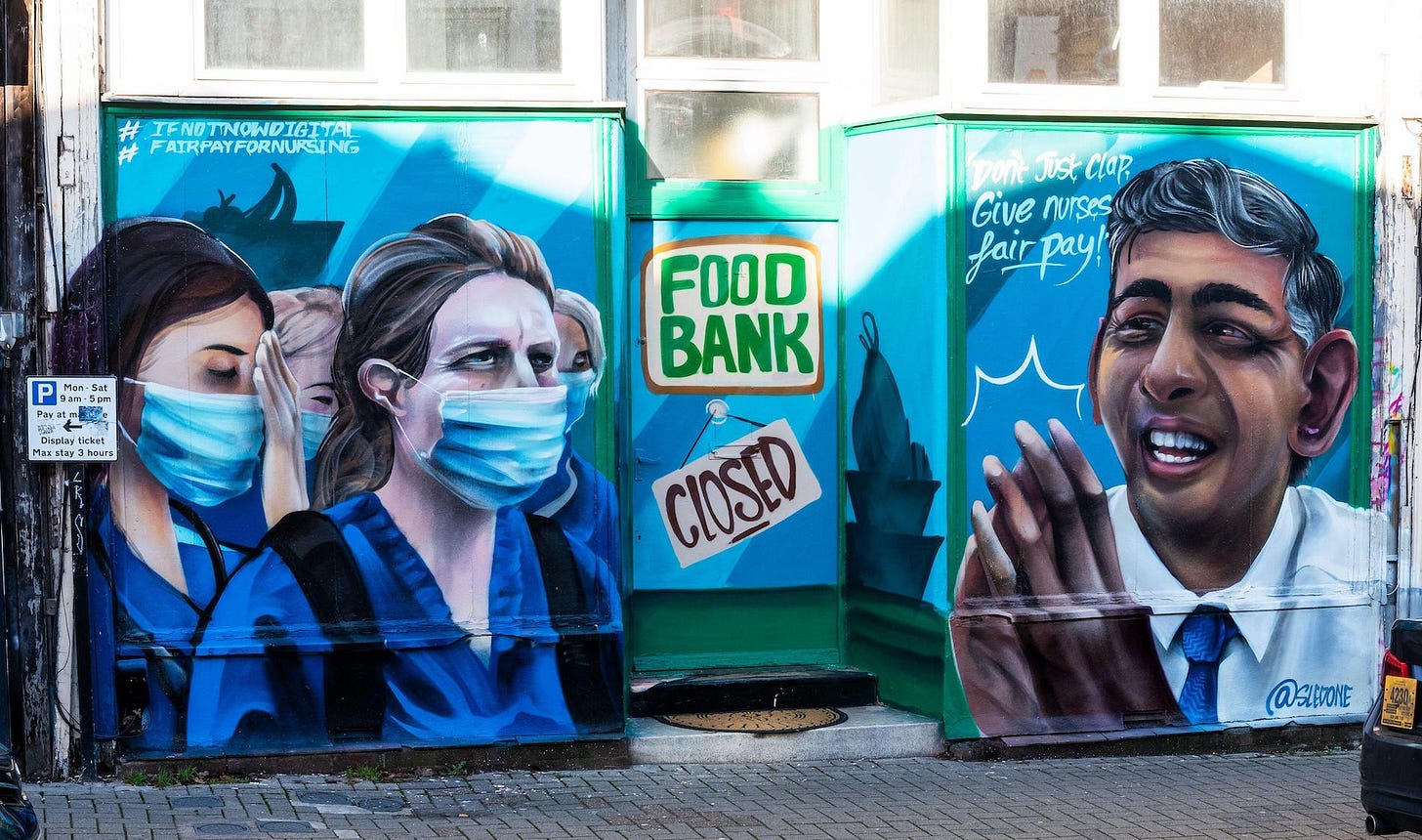Rishi Sunak’s Promises Don’t Add Up and the Public Don’t Trust Him to Deliver Them
New polling shows the public doesn't trust the Prime Minister to deliver any of his five new promises to the British people.
Rishi Sunak this week used his first big speech as Prime Minister to make a series of new promises to the British people.
Unfortunately these promises, which cover everything from the economy to immigration, do not hold up to much scrutiny.
As Labour quickly pointed out, almost all of the pledges are due to happen anyway, without any need for further contribution from the Prime Minister.
Inflation, which Sunak merely pledged to halve, is actually forecast to fall by two thirds over the coming year, in large part due to falls in global oil and gas prices.
Similarly, the Prime Minister’s promises to grow the economy and reduce national debt, also merely mirror existing forecasts from the Office for Budget Responsibility.
In fact not only are most of Sunak’s pledges hard for him to miss, but he won’t even state when he plans to meet them.
Asked to put a date on when each pledge will be met, Sunak replied that the public “wouldn’t expect” him to set this out.
Yet despite setting this incredibly low bar for himself, voters still don’t trust him to cross it, according to new polling commissioned by the Byline Supplement.
Asked whether they trust Sunak to deliver on each of his five pledges, a majority of those surveyed by pollsters Omnisis said that they didn’t.
Just one-in-five voters said they trusted Sunak to cut national debt, or halve inflation.
Meanwhile seven-in-ten of all voters and more than half of Conservative voters said they didn’t trust the Prime Minister’s pledge on the NHS.
This scepticism is warranted. In November the Prime Minister’s Press Secretary confirmed that all of Sunak’s campaign pledges from the summer were under review to see whether they were “deliverable”.
Yet despite this incredible U-turn, the Prime Minister this week still insisted that he could be trusted to deliver his latest set of promises.
“I will only promise what I can deliver and I will deliver what I promise”, Sunak told the country.
Strike Out
Missing from the Prime Minister’s five pledges was any concrete pledge to tackle the current waves of strike action spreading across the country.
However, Sunak is expected to shortly unveil details of new legislation to restrict the rights of workers to go on strike. The legislation, which is expected to include requirements for “minimum levels of service” will effectively outlaw all-out strikes in some parts of the public sector.
Such legislation will be hugely controversial. While strike action is not popular with the public, there is a huge amount of public sympathy for nurses and other public sector workers who have been forced to take big real-terms cuts to their pay over the past decade.
Recent polling commissioned by this publication found that 84% back demands by nurses for their pay to rise at least in line with inflation.
The public mood appears to have emboldened the Labour Party on this issue.
Keir Starmer this week told journalists, during his own New Year address, that he would repeal any new restrictions on strikes brought in by the Prime Minister.
New polling commissioned by the Supplement suggests that the public are deeply divided on the issue, however, with 34% backing Starmer’s plan to repeal the new laws, and 36% disagreeing.
Are Extinction Rebellion Extinct?
By Adrian Goldberg
It was a sobering message to receive from “Extinction Rebellion” on the morning after New Year’s Eve: “We Quit”.
Were members of the environmental pressure group which clogged up some of the main thoroughfares of London during protests of 2018 and 2019 really planning to hang up their “Climate Emergency” placards forever?
Not a bit of it. The group are seasoned publicists and knew that a dramatic headline would attract bleary, hungover eyeballs. And so it proved, with coverage over the next 48 hours on both BBC News and in The Guardian, although nothing quite in depth – we’d like to think - as Clare Farrell’s exclusive appearance on the Byline Times Podcast this week.
Clare - one of the co-founders of XR - explained that while the group is temporarily giving up its trademark disruptive protests, it’s all in the interests of playing a longer game.
With other organisations such as Just Stop Oil and Insulate Now having emulated their shock tactics, there’s concern that headline grabbing actions ultimately provide an easy distraction for news organisations which don’t really want to address the underlying issues.
“The media has stoked this debate about which tactics are right - is it this? Is it that? - and constantly throw the light on to activists and individuals”, she says.
This – conveniently for some – leads to endless debates about the nature of the protests rather than the root cause that inspires them i.e the reality of climate breakdown.
As Clare observes, “If you pay attention, it's inescapable to realise that the systems are already in a state of very rapid change. Everybody's saying, even the most learned kind of experts in the fields, it's worse than we thought, and it's faster than we thought.
“The impacts are everywhere… look at the state of what's happened to the poor people of Pakistan, the ravages of the famine that happened in Madagascar recently.”
She admits to being surprised at how widely the narrative of climate emergency has been accepted by the public, but cautions, “They know, it's a crisis, but they really haven't worked out what to do about it or how to behave as if it's a crisis or how to demand that those in power actually act as if the house really is on fire”.
So now XR are trying a different tack, attempting to mobilise a mass rolling protest at the Houses of Parliament from April 21.
It’s an attempt to defang those in the media who deride XR and other protest groups by calling them lawbreakers. If there’s a simple demonstration attended by tens of thousands of our fellow citizens, will their message be taken at face value?
Clare says, “we're going to go out and throw a gauntlet to the British public, to the Third Sector to all the well-wishing people online that say ‘oh, I don't like what you do, but I know it's a crisis.’
“So we're just going to do a big job on mobilising for the next few months, we won't get too much in anyone's way…if we say that, will you now come and come and hang out with us?
“Because we really need to build bigger numbers. And let's just see how it goes.”
Listen to the full podcast below.
So are Extinction Rebellion right to suspend disruptive protests? What’s the best way to raise the alarm over the climate emergency? Join the debate here.





There is an interesting thread tying together the parts of this post: how far our democratic rights are being threatened by a lying, corrupt government.
If XR can find a way to get "ordinary people" out in big numbers to protest our government's failures on climate change, and Enough is Enough do the same on economics, and nurses & doctors call out big crowds protesting the problems in the NHS, even daily fail readers are going to realise there really are big problems & the idiots in Downing St are making them worse not better with their attempts to shut down discussion.
We do maybe have time to change direction on climate change, but if we are going to do that, we need to shake off the way the very rich control the government. These overlapping issues might be the way to get a start on that.
Britain eliminating all carbon emissions tomorrow will not stop global warming, or slow it by as much as a 5% reduction by China which is emitting due to the"West" relying on it for washing machines, solar panels etc. Probably we should stop importing from China which would then require a war to rebalance its economy. Look out Taiwan !!!